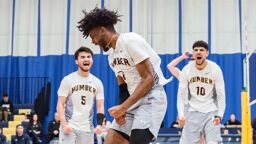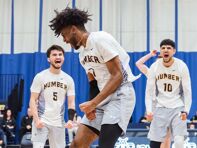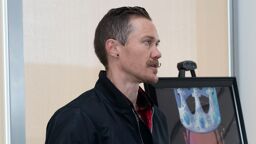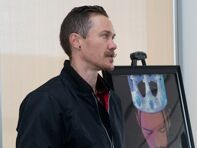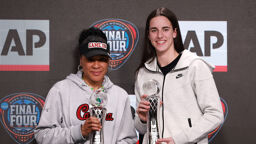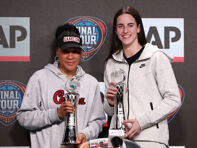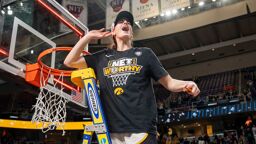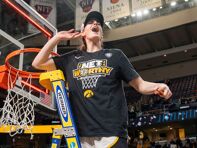Before the sports world came to a standstill due to the coronavirus pandemic, longtime women’s college volleyball coach James FInley had already pegged 2020 as a chance to step back and take stock. Finley announced his retirement from coaching in December 2019, ending a 21-year career, 19 of which he spent as head coach at Arizona Western College, Virginia Commonwealth University and Seattle University.
Stepping away from the sideline gave Finley a chance to reflect on his experiences navigating the college sports landscape as an out gay man and take a much deserved breather from a job that easily consumes daily life. “It’s been pretty amazing just to be home,” Finley told Outsports. “Because of my career and what I’ve done, everybody just assumes I’m an extrovert. I’m really not. I love being around people, but my peace and quiet is being by myself.”
The decision to end his 7-year tenure at SU might’ve surprised some in volleyball circles, but it was a carefully made decision for Finley. He first began thinking about retirement two years ago and used that time to set himself up for post-coaching life. He started a Masters degree program in management and leadership in 2019, focused on building up his annual volleyball camp partnership with Nike and aided SU in searching for his replacement.
Despite all that prep work, Finley still felt strange when classes resumed in January. “It was bizarre,” he said. Finley supplemented any odd feelings by staying in contact with his former players and reconnecting with friends, but Covid shutdowns put those interactions, along with his planned camps, on the bench.

“The only thing that kind of kept me connected were past relationships with coaches and former players,” Finley said. “I told somebody If I get to touch a volleyball in the gym, I’m gonna hurt myself because I’m going to be so excited that I’m gonna do something stupid.”
That pandemic-induced break from the gym provided the perfect opportunity to look back at the trail Finley blazed through the NCAA coaching ranks. Finley wasn’t out publicly until arriving at VCU in 2005, but not because he wasn’t fully ready prior to that. He was set to live his truth when he accepted his first head coaching job at AWC in 2001, but that hit a snag on his first day over a late night Diet Coke with his new boss.
“We’re sitting in his office and we’re just talking and everything about life and I asked him ‘Did you prefer to hire a female instead of a male coach?’ He said, ‘Well, it was down to you and one lady, but she was a lesbian and I hate that shit,’” Finley recalled. “I almost died right there in my chair. Again, I’m in an environment where I’m going to have to not be myself.”
Finley found acceptance from other co-workers during his time at AWC, a pattern that continued after coming out and building a successful women’s volleyball program at VCU. But that familiarity returned in 2012 when newly hired athletic director Ed McLaughlin fired Finley after leading his team to a 25-6 record in its first season in the Atlantic 10 conference.
Finley has continually asserted that his firing was rooted in homophobic discrimination. “It was more of a shock to just be completely put off to the side and not spoken to… it was the worst I’ve ever been treated in my life,” Finley said. “I thought, ‘Nah, doesn’t matter. We’re going to get through the season. We’re having a great year.’ But it didn’t matter. It was quite bizarre.”

That frustrating exit ultimately led to a seven-year run at SU that Finley sees as the most freeing experience of his career. “Our joke is that it took a Jesuit school to accept the gay Jewish boy,” Finley said. But it also provided a vantage point for Finley to identify why LGBTQ acceptance within college athletics rose to the heights celebrated today.
“The thing that I’ve seen the most over the last ten years particularly has to do with student-athlete activism and allies. The generation that’s been coming up, they’re just so much more open,” Finley said. “You have a generation coming up who is more willing to be out and doesn’t really care what other people think as much, even though it’s hard. There was more acceptance at home. You have all of these organizations, allies and equity departments on campuses that were really developing and creating a safe zone … it’s just cool. A lot of people don’t say anything or do anything because it’s just like it’s no big deal. This is who I am.”
A similar optimism now drapes over the circumstances around Finley’s exit from VCU as well after the Supreme Court’s ruling on sexuality-based workplace discrimination in June. “That’s going to really open the door for us to finally have equal rights and a lot of different avenues not just workplace discrimination, but housing and healthcare.”
But those gains don’t signal the end of the path to acceptance. While Finley has noticed more coaches and student-athletes becoming more vocal and coming out over the last decade, there is still a severe lack of LGBTQ educational and cultural resources provided by the NCAA.
“They should be doing more… [In Seattle], we’re in a very liberal place. You go to a lot of conservative places and it’s not the same,” Finley said. “You get pushback and people are more timid to help or to do things because they’re worried about their own career. Even as a straight coach, am I going to get in trouble? Are people going to want me to be gone because I’m standing up for this?”

The critiques are valid, but Finley does see positives in the stances taken by the NCAA at times. Especially when it comes to recent developments in Idaho following the passing of discriminatory legislation against trans female athletes earlier this year. One of Finley’s former players is trans, and the experience of supporting him and facilitating conversations about identity with his family pushed Finley’s own understanding of other communities under the LGBTQ banner.
“I’m so thankful that I was in a place that I could be there for him as opposed to, maybe a year earlier, I would have just stuttered and not know what to say or do,” Finley said. “Everybody has journeys and transitions. That’s one thing I told my student-athletes and everybody else: you have to give people time to change or process.”
Observations like that are a key reason why Finley holds so much hope for LGBTQ communities within sports moving forward as he enters retirement. “I hope that they continue to grow, stand up and normalize who they are. I just want us to get to a place where no one feels isolated, alone or ashamed of who they are because they want to fit into their team or they want to be accepted by their coach,” Finley said. “I’m so thankful that a lot of student athletes are in that situation, but I’m still really sad for those who don’t get to experience that and many of those I know still end up quitting. There are a lot of kids that don’t play college sports that should simply because, you know, they feel like they can’t have a normal life.”
For now, though, Finley seems ready to enjoy post-coaching life alongside that continued advocacy. “I don’t miss working every weekend, being away from home and having seasonal relationships where I have to renew all my friendships in January… my husband always says, ‘Hey, this is my boyfriend, he really exists. He doesn’t live in Canada.’”







